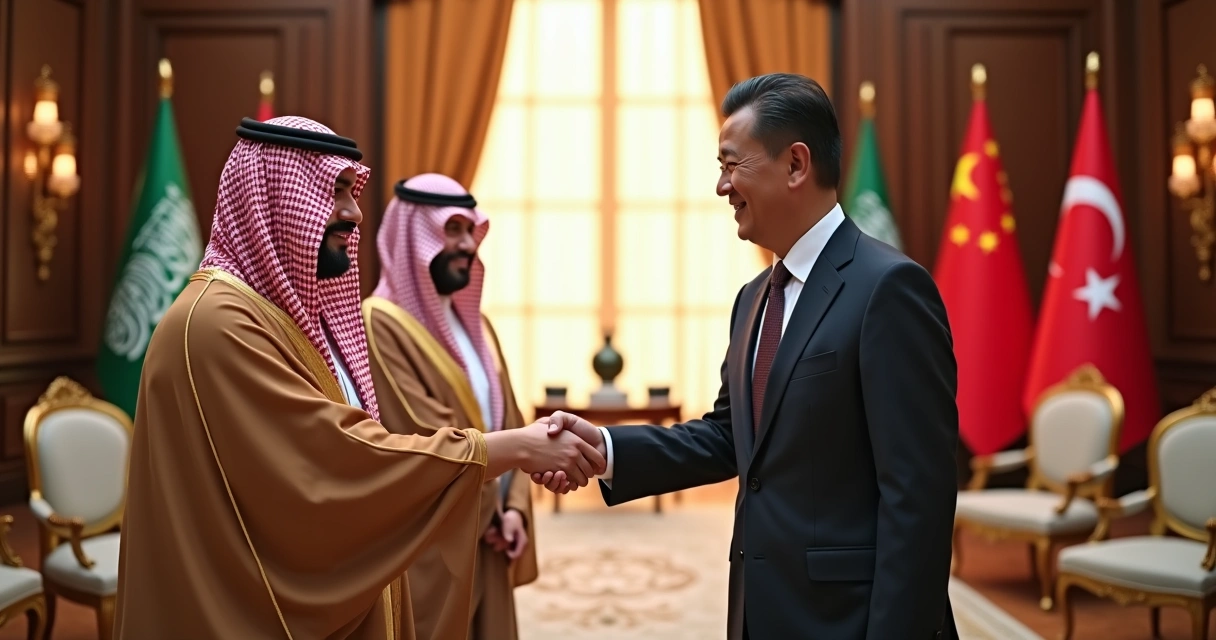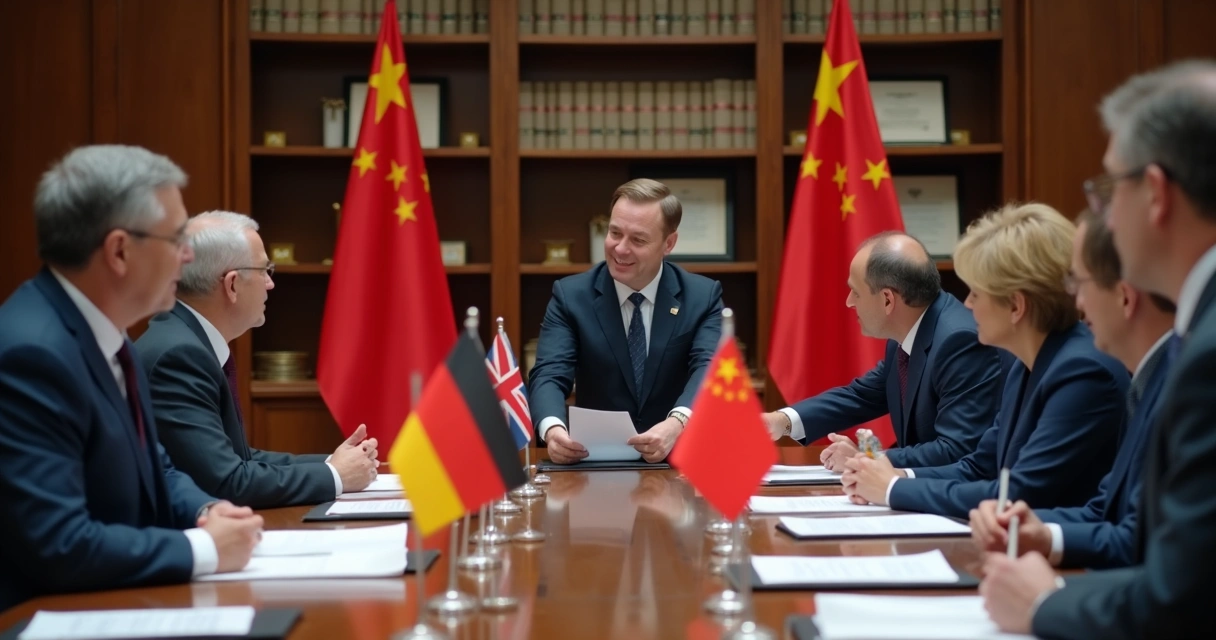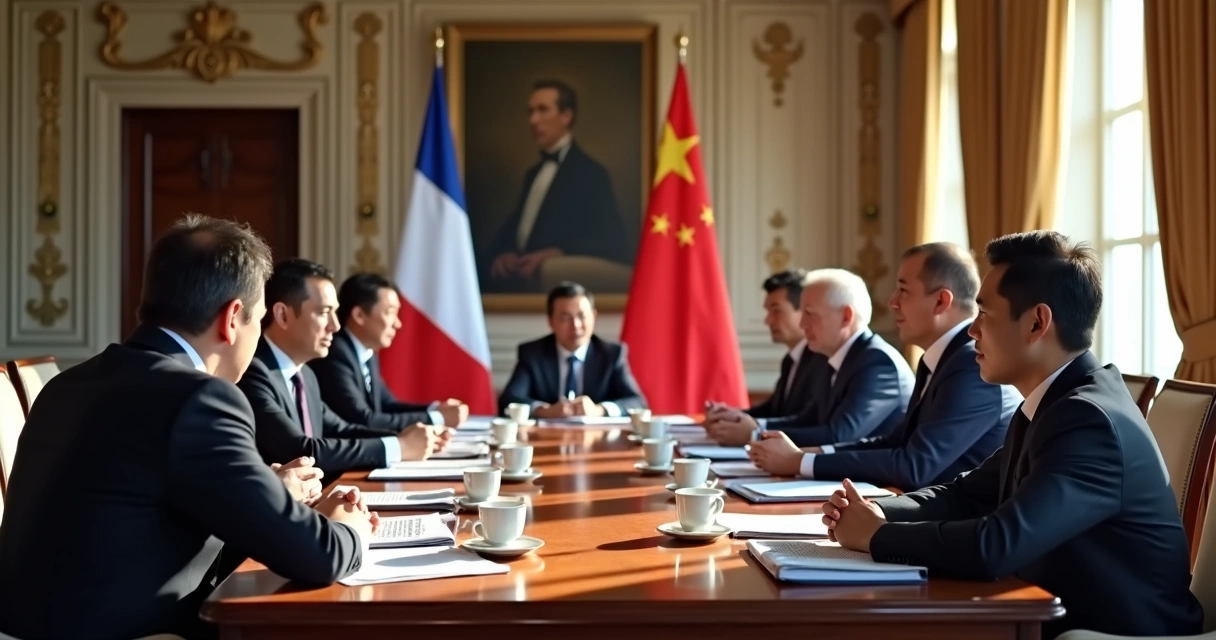In my two decades of interviewing, listening, and sometimes even stumbling through cross-border business, I have seen that what matters most isn’t just chasing numbers or landing contracts—it’s quietly understanding the codes that lie beneath every handshake. For Chinese companies venturing into new lands such as Saudi Arabia, Germany, France, and the UAE, compliance is not only an exercise in rule-following. It is a test of patience, tact, and learning to read between the lines.
Setting foot in a foreign market, I often imagine myself as a guest attending a family dinner unannounced. Legal compliance—it’s like the dinner invitation; but cultural etiquette is the seat at the table. Without the second, your dinner may taste awkward. That’s why, in my experience and through the work I do with Enterprise Workforce Solutions (EWS Limited), I have grown sensitive to the blend of law and behavior required when engaging with local governments. For Chinese companies, especially those in rapid growth stages, ignoring cultural nuance isn’t just impolite; it’s risky.
Cultural compliance is the practice of aligning your actions and communications with the social customs and values of the host country, especially when dealing with government bodies. It goes deeper than ticking regulatory boxes. It stretches into rituals, modes of address, attitudes toward authority, and the rhythms of business conversation.
I have seen firms pass every legal test on paper, yet falter because the manager interrupted a meeting to answer a phone, or sent the wrong kind of gift. If you are building a scalable HR strategy for international teams, these missteps can unravel even the best-laid plans.
For Chinese firms, the cultural differences are more than a translation issue. You are often perceived, fairly or not, as a representative of a nation whose approach to hierarchy, negotiation, and group harmony can clash (or sometimes align) with local expectations. In my view, cultural compliance is an active, ongoing adjustment—sometimes a tug-of-war between your own instincts and those of your hosts.
And why should you care? Because a single error in etiquette, a misplaced assumption, or a hasty agreement can close doors with local officials that would otherwise stay open.
 Unpacking compliance etiquette in Saudi Arabia
Unpacking compliance etiquette in Saudi ArabiaSaudi Arabia is moving swiftly—culturally, economically, and technologically. It is still, however, deeply rooted in Islamic traditions and tribal values. When I first worked with a Chinese tech firm in Riyadh, I quickly realized that punctuality, patience, and personal introductions were not formalities: they were foundations.
You may have read studies showing how Saudi Arabian corporate governance is molded by cultural values—not only the rule of law. For minority investors and foreign partners, these unwritten codes often matter as much as the legal text (University of Gloucestershire research).
Personal trust outweighs documentation in the early stages of a Saudi relationship with government entities. A formal MoU matters. But a trusted introduction from a respected local partner will open doors faster than any contract, at least in the beginning.
Meetings with ministries or high-level officials in Saudi Arabia may appear slow to Chinese managers accustomed to punctuality and rapid progress. Initial conversations circle gently around the purpose, often punctuated by strong hospitality. Small talk is not small here; it signals respect and genuine interest.
If you train your team well, you’ll see improved engagement and harmony, as found in NCBI/PMC studies on leadership and training in Saudi organisations.
I learned (sometimes awkwardly) that all meetings in Saudi Arabia, even in secular settings, are shaped by the rhythms of prayer and the acknowledgment of Islamic values. Trying to push through a meeting during prayer time is not just rude—it ensures you won’t be invited back.
Pause for prayer. Wait in silence.
Dress codes are also strict. For men, dark suits. Women must wear loose abayas, though head coverings for foreigners have become less common. Always err on the side of formality.
Saudi law may be written (sometimes) with ambiguity. I have seen foreign executives sign agreements based on initial enthusiasm, only to face delays due to unstated requirements issued by various ministries after the fact. It pays to engage local legal experts early.
The path to compliance runs through not one but often three or four ministries. You may need permits from the Ministry of Investment, Labor, and sector regulators. If you are planning your first overseas hire, look into how PEO and EOR differ when starting international expansion.
Saudi Arabia’s push for investment has led to new ministries and agencies, like the Culture Ministry and General Authority for Entertainment. There is ample public funding, but with it, closer oversight (LSE analysis of policy measures). It’s not just about knowing the rules—you must track how quickly those rules are changing.
If you’re entering high-tech or AI, government-university partnerships are emerging rapidly, especially as Gulf universities strengthen research with international experts. Chinese companies in AI and technology must understand these joint projects often serve not only business interests but also regulatory priorities. This is not a sideline; it’s the core way business and government shape their relationship in emerging fields (Gulf–China AI collaboration).
It would be short-sighted to ignore the regional geopolitics and history. As CEIBS commentary reminds, Saudi can be a bridge but comes with its share of crosswinds.
 Compliance etiquette in Germany
Compliance etiquette in GermanyIn Germany, you’ll find the opposite rhythm from Saudi Arabia. There, I noticed, meetings run by the clock, not the calendar. If you’re five minutes late, you may have already lost ground—even with government partners.
Discussions, even in government offices, go straight to the point. If a Chinese manager starts with long contextual framing, German officials may seem impatient. They value efficiency, clarity, and well-organized documentation above all.
It is tempting to match German formality with deference, but hierarchy is different here. Respect is shown through professionalism, not grand titles. Bureaucrats see themselves as public servants, not gatekeepers.
Dress code is less strict than in Saudi Arabia, but businesslike is the norm. Men and women alike wear suits. Titles are used, mostly, but can be dropped after the first meeting. Small talk exists, but finish it quickly and start business.
Written records are valued over oral agreements. Minutes of the meeting, action items, and clear follow-up dates all matter. You will be expected to respond with equal formality.
German bureaucracy can feel overwhelming. Every process is codified: work permits, data protection, labor contracts. But the rules are published, accessible, and usually enforced evenly. I have seen teams delayed because of a missing notary stamp, yet once corrected, progress is predictable.
For Chinese firms, having a local compliance specialist is a good idea, especially to avoid accidental misclassification of workers, as discussed in this guide to legal risks and worker status.
One lesson I learned the hard way: German officials avoid informal requests. If you need an exception or favor, there is a form, a deadline, and a published channel. They expect transparency—from you and from themselves.
For company formation, unique local rules apply to even the simplest procedures. Some processes may need double authentication for Chinese business licenses or official translations. It’s not distrust—just process.
Random compliance audits are routine. Don’t take it personally. If government agents visit, treat them as guests but do not offer food or gifts—this will be politely declined, sometimes suspiciously.
In summary, to handle Germany’s compliance culture, lean into clarity above charm.
 French compliance etiquette: Art of relationship and formality
French compliance etiquette: Art of relationship and formalityFrance rewards formality, yet it runs on relationships. While rules are strictly enforced, I have found that doors often open via introductions and regular presence, not just documentation. Both are required.
At official meetings or when visiting ministries, address people by their professional titles unless told otherwise. Dress conservatively—dark suits for men, smart attire for women.
Meetings almost always start with small talk about culture, food, or current events. Do not skip this step; it is not slowness but a chance to show you are interested beyond business.
Gifts are rare, especially when dealing with government agencies. If you feel it’s necessary, keep it symbolic and modest. Bottles of wine, regional delicacies, or books are acceptable, but always subtle.
Government officials will rarely accept private dinners or gifts during an official process. Wait until after deals are concluded, and then only if there is cause for celebration.
French administration is infamous for paperwork. Forms must be in French, signed, stamped, and submitted through the correct channels. Approvals may come slowly. Patience is not just recommended; it’s required.
If you want to grow your team in France, check whether your HR policies meet French labor codes. An international HR strategy designed with country-specific guidance will keep surprises to a minimum.
French labor inspections focus on fair work conditions, not just tax or visa issues. Keep your payroll process transparent and your employment contracts in order. If uncertain, consider how payroll outsourcing solutions like those I work with at EWS can prevent hidden risks.
Unlike in some countries where labor groups are weak, French unions wield significant influence in policy and enforcement. If government meetings touch on employment or restructuring, expect unions to request documentation or consultation rights. Neglecting them can create delays or even legal action.
 UAE: Fast change, firm rules
UAE: Fast change, firm rulesThe United Arab Emirates moves at a breathless clip compared to almost anywhere else. Government offices may look ultra-modern, but etiquette still reflects Emirati values of respect and hospitality.
Meetings with government ministries often begin with Arabic coffee and short pleasantries. Starting with business, before exchanging respect, is frowned upon.
While the UAE prizes efficiency, processes sometimes pause for religious or cultural reasons. Friday is a holy day, and meetings scheduled then are rare. Expect calls or requests to be answered during evenings, which might surprise new arrivals.
The spoken word is highly regarded, but formal MOUs and contracts are still necessary for government processes. In my experience, flexibility helps: learn to accept last-minute meeting changes or unexpected delays due to higher-level approvals.
Licenses, visas, and permits may fall under multiple ministries. The process feels digital at first, but behind it are layers of approvals that sometimes depend on senior officials’ sign-off.
When responding to spot checks, inspections, or document requests, politeness and accuracy take precedence. Transparency means admitting errors early, rather than trying to explain them later.
For mobility and relocating teams, the UAE can be welcoming if you partner with organizations who know local processes; international mobility insights make a meaningful difference here.
Language also matters. While English works for documents, Arabic communications signal seriousness and respect for local norms.
Every country teaches us something about ourselves as much as about their culture. The patient negotiation style of Saudis, the directness of Germans, the subtle formality of the French, or the quick-but-firm approach of Emiratis—each can feel strange until you see the why behind the ritual.
There was a time in Berlin when my Chinese client handed over a red envelope to a German official, expecting warmth, and the gesture fell flat. Or the visit to a Paris ministry where a delayed introduction meant hours of polite tea—but no decisions until a local champion stepped in. In Riyadh, a missed call to prayer forced us to reschedule everything.
Every one of these stumbles was a lesson in humility. In my work with Enterprise Workforce Solutions, I have come to appreciate that compliance isn’t a checklist—or even just a strategy. It’s a state of mind. The best compliance officers, in my opinion, are part translator, part diplomat, and part therapist.
Cultural compliance is never finished. Laws change. Customs shift. Relationships ebb and flow. For Chinese firms entering Saudi Arabia, Germany, France, or the UAE, success rests not only on the right documents, but on understanding—and living—the etiquette of trust.
If you are unsure where to begin, don’t just scan another checklist or search for magic words. Instead, invest time, listen, and be prepared to make some small but honest mistakes. If you seek help, choose a partner who prizes both legality and the human side of business. At EWS Limited, I have seen how a small shift in manners, or an extra call to a local advisor, can mean the difference between misunderstanding and mutual progress.
If you are planning cross-border hiring, compliance, or market entry, or even just want to know how to approach a ministry official, I invite you to reach out to EWS Limited for deeper guidance and peace of mind. We connect the dots—so you can focus on what matters to you.
Cultural compliance in business means behaving according to local customs, values, and formal rules when operating in a host country, especially during official or government interactions. It is about more than legal procedures—it also includes respectful communication, culturally appropriate business gestures, and adapting to local expectations. For example, it may affect how you give a gift, dress for a meeting, or structure an agenda. For Chinese companies abroad, cultural compliance is the difference between polite presence and genuine acceptance.
In my experience, trust is built slowly. Start with punctual arrival and careful listening. Use local introductions where possible, and always show humility about your own knowledge gaps. Consistency in communication and following up on promises goes a long way. If you make a mistake, admit it early. Most officials value honesty and effort more than perfection.
Common mistakes include assuming one-size-fits-all etiquette, arriving late, not preparing documents correctly, or offering gifts where they may not be appropriate. Others lose face by not involving local advisors early, or by ignoring unofficial but very real hierarchies. Finally, trying to cut corners or “rush” government processes usually backfires.
The best way is to prepare. Learn the basics before your first visit, and if possible, ask a local expert or coworker to guide you. Pay attention to small signals—who speaks first, how business cards are exchanged, whether small talk is expected. When in doubt, observe quietly or ask. If confusion arises, apologize politely and reset.
Gifts can be a sensitive issue in government meetings. In Saudi Arabia, modest symbolic gifts may be accepted, but never anything extravagant. In Germany and France, gifts to officials are rare and, in some cases, either discouraged or seen as a compliance risk. In the UAE, it’s safer to wait until a relationship is established, and even then, stick to modest, locally appropriate tokens. Always check local guidelines and consult with a trusted local or compliance partner.
How Recruiters Use EOR to Handle Rapid Global Onboarding
Top 5 EOR Red Flags to Avoid in 2026
EOR vs Entity Setup in 2026: What Startups Need to Know
10 Things You Didn’t Know Your EOR Could Do
When to Use a Payroll Provider vs Full EOR in Global Hiring
January Compliance Watch: What’s Changing in APAC Labor Laws
Hiring in Turkey in 2026: Costs, Contracts, and EOR Options
Contractor or Employee? Compliance Risks to Watch in 2026
What’s Changing in European Payroll Compliance in 2026?
How to Use EOR to Win More Government or Public Sector RFPs
Hiring in Colombia: Fast-Growing Talent Pool, Low Total Cost
Remote Tech Jobs Surge 33% in Ireland: Skills You Need Now
Remote Work in APAC: 7 Data-Driven Trends for 2026 Expansion
Remote Payroll Headaches: 7 Mistakes HR Teams Make
Freelancer vs EOR in 2026: Cost, Risk, and Speed Compared
How Employee Experience Drives Retention and Business Growth
How HR Can Reduce Burnout Amid AI, Budget Cuts, and Change
Employment Contracts: What HR and Global Managers Must Know
PEO Explained: How It Simplifies Global Workforce Management
Global Mobility: A Complete Guide for HR and Global Managers
Remote Workforce: A Complete Guide to Managing Global Teams
Workforce Planning: A Step-by-Step Guide to Strategic Hiring
How Recruiters Use EOR to Increase Revenue Per Client
The Secret to Winning Global RFPs? A Strong EOR Partner
Top 7 Hiring Trends Shaping Global Teams in 2026
Hiring in Türkiye: Key Labor Laws and Employer Risks in 2026
GCC Hiring Compliance Update: What’s Changing in 2026
How to Hire in Turkey in 2026: A Strategic EOR Guide
Why modern recruitment agencies outsource compliance to EOR partners
How adding an EOR partner helps agencies win more RFPs
EOR Opportunities in Poland: Why It’s Europe’s Talent Powerhouse
Cross-Border Hiring Trends for 2026: Insights for Global Recruiters
How to Build a Scalable Payroll Strategy Across MENA
Contractor vs Employee in Germany: What’s the Risk in 2026?
“Place globally, bill locally” — the new recruiter cheat code
Top 5 Compliance Mistakes When Expanding to the UAE
Why EOR is Key to Winning Public Sector Tenders in Europe
Growth formula for agencies using EOR to expand key accounts
How EOR helps recruiters stay ahead of fast-changing GCC compliance
Employer of Record in Mandarin: What is 境外雇主服务?
How to Use an EOR for Temporary Projects (中国公司如何为短期海外项目使用EOR服务)
Why “Go Global” Must Include Compliance (“走出去”战略中的合规盲点)
中资企业如何选择欧洲EOR供应商?(How to Choose the Right EOR Partner in Europe)
与当地政府打交道:中国公司需要了解的合规礼仪 (Cultural Compliance for Chinese Firms)
中国公司海外人力结构案例分析:制造业、科技与能源 (HR Case Studies: Chinese Firms Abroad)
How Guanxi Influences Hiring in the Middle East (关系在中东招聘中的作用)
Top 5 Risks When Hiring in the Gulf (中国企业在海湾地区招聘的五大风险)
Managing Compliance in Multi-country Projects (中国企业多国项目的人力合规管理)
The $100K Visa Shock: Why Global Hiring Just Replaced the H-1B
How to Set Up Payroll For Hpc And Ai Teams
Contracting Machine Learning Talent Abroad
Everything on Hiring Foreign Phds In German Tech Labs
Cross-Border Ip Protection In R&D Teams
How To Classify Freelancers In Tech Innovation
How Eor Helps Tech Firms Legally Hire In Germany
Dual Contract Structure For International Researchers
Data Protection Obligations For Remote Tech Staff
Germany Research Visa Vs Skilled Worker Visa
Everything on Nis2 Directive Compliance For Eu Tech Workers
Global Mobility For Deep Tech Startups In Germany
Payroll For EU Embedded Systems Developers
Relocation Support For Semiconductor Experts on EU
The Absolute Way to Hire Ai Engineers In Germany
How to Manage Benefits For German Tech Hires
Germany’S Blue Card Process For Engineers
Everything on Germany R&D Employment Compliance
Remote Hiring Of Cybersecurity Analysts In Eu
Visa Pathways For Quantum Computing Researchers
Onboarding Robotics Specialists Across EU Borders
Workforce Planning In Ai-Driven Logistics And Infrastructure
Visa Processing For High-Tech Infrastructure Staff
Managing Global Mobility In Sustainable City Projects
Cross-Border Team Management In Saudi Data Centers
Hiring Skilled Labor For Green Hydrogen Facilities
Digital Twin Technology Hiring Trends In Saudi Construction
Employer Obligations In Public-Private Energy Initiatives
Navigating Local Labor Laws For Solar Energy Teams
Talent Acquisition In The Saudi Mining Sector
Eor Solutions For Ai Engineers In Mega Projects
Regulatory Challenges In Hiring For Giga Construction Projects
Contractor Compliance In Smart City Developments
Classification Of Engineering Consultants In Vision 2030 Projects
How To Manage Workforce For Neom-Based Tech Projects
Eor For Multinational Mining Firms Operating In Saudi Arabia
Employer Of Record For Wind Energy Projects In The Gulf
Relocation Logistics For International Clean Energy Experts
Hiring Strategies For Large-Scale Construction Projects In Ksa
How To Onboard Digital Infrastructure Experts In Saudi Arabia
Payroll Setup For Renewable Energy Workers In Ksa
Strategic Relocation To Riyadh Or Doha: A Guide for Global Employers
Work Visa Processing In Qatar And Saudi Arabia
Qatar Nationalization Policy And Foreign Firms
Cost Of Setting Up A Business In Qatar: A Guide for Global Employers
Saudi Labor Court And Dispute Handling for Global Employers
Cross-Border Payroll For Ksa And Qatar Teams
End Of Service Benefits Saudi Arabia: A Guide for Global Employers
How To Manage Expat Benefits In Qatar for Global Employers
Expanding Into New Markets: Vendor Risks You Should Flag
A Guide to Cross-Border Equity Vesting for Tech Startups
Employer Branding for Multinational Teams: What Works Now
What Global C-Level Leaders Miss About Digital Nomad Visas
Succession Planning for Distributed Teams: A Practical Guide
Relocation Budgeting For Global Tech Firms
Latam Hiring Strategy: What Global Companies Should Know
Risk Of Permanent Establishment Explained
Managing Intellectual Property In Remote Work
Benefits Benchmarking Globally for Global Companies
How to Benchmark Compensation Across 100+ Countries in 2025
Checklist: Preparing HRIS for Fast International Scalability
Biometric Data in Global Payroll: Legal Boundaries Explained
8 Regulatory Updates Impacting Global HR in 2025
What are Hidden Costs of In-House Payroll?
Why Companies are Thinking Differently About Relocation
Is Your Global Mobility Program Outgrowing Spreadsheets?
Remote Work Visas: A Growing Trend in Global Mobility
Hiring in Europe Post-Brexit: What You Need to Know
Tips for Managing Multi-Time Zone Teams Successfully
Relocation Packages: What Top Talent Expects in 2025
Banking and Payroll Challenges in Saudi Arabia Markets
The Legal Risks of Misclassifying Global Workers
Why Scalability Should Drive Your Global HR Strategy
How EWS Streamlines Global Mobility for Tech Talent
Lithuania – Employer of Record
Kosovo – Employer of Record
Finland – Employer of Record
Namibia – Employer of Record
Nepal – Employer of Record
Spain – Employer of Record
Latvia – Employer of Record
Ireland – Employer of Record
Cyprus – Employer of Record
Czech Republic – Employer of Record
Italy – Employer of Record
Indonesia – Employer of Record
South Africa – Employer of Record
Tunisia – Employer of Record
Bosnia – Employer of Record
Moldova – Employer of Record
Five Tips For Improving Employee Engagement
Netherlands – Employer of Record
Germany – Employer of Record
France – Employer of Record
Portugal – Employer of Record
Bulgaria – Employer of Record
Austria – Employer of Record
Hungary – Employer of Record
Slovenia – Employer of Record
INCLUSIVITY IN THE TEAM MAKES EVERYONE WIN
Thailand – Employer of Record
Sri Lanka – Employer of Record
The Significance of an Employer of Record
Greece – Employer of Record
Mexico – Employer of Record
4 Reasons to Outsource Your Payroll
Five Recruitment Trends 2023
Malaysia – Employer of Record
Skill-Based Hiring and Benefits
Malta – Employer of Record
How To Practice Inclusive Recruitment
Israel – Employer of Record
Macedonia – Employer of Record
Jordan – Employer of Record
Macau – Employer of Record
Peru – Employer of Record
The Importance of Employer Branding
Bahrain – Employer of Record
South Korea – Employer of Record
Recruiting during a recession
Philippines – Employer of Record
USA – Employer of Record
Japan – Employer of Record
How To Setup A Business in 2023
Norway – Employer of Record
Managing Overseas Projects In 2023
Reason Of Expanding Your Workforce Globally
Croatia – Employer of Record
Colombia – Employer of Record
5 Ways To Speed Up Your Hiring Process
Egypt – Employer of Record
3 Ways To Streamline An Interview Process
Russia – Employer of Record
Saudi Arabia – Employer of Record
Hong Kong – Employer of Record
An Effective Hybrid Work Model
Turkey – Employer of Record
UAE – Employer of Record
Pakistan – Employer of Record
7 Things to Consider Before Accepting a Job
Kazakhstan – Employer of Record
3 Reasons to Encourage Employees to Generate Employer Brand Content
Denmark – Employer of Record
Sweden – Employer of Record
Bangladesh – Employer of Record
Kuwait – Employer of Record
How To Hire In The Age Of Hybrid Working
Australia – Employer of Record
Oman – Employer of Record
Qatar – Employer of Record
Ukraine – Employer of Record
Diversity – A Vital Hiring Strategy
Owning Every Moment of Your Hiring Experience
Serbia – Employer of Record
Maldives – Employer of Record
India – Employer of Record
Argentina – Employer of Record
Uzbekistan – Employer of Record
Belarus – Employer of Record
Brazil – Employer of Record
Chile – Employer of Record
Armenia – Employer of Record
3 Steps To Company Formation In The UK & Abroad
Romania – Employer of Record
Canada – Employer of Record
Morocco – Employer of Record